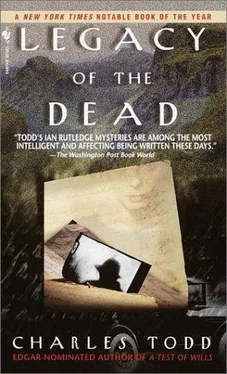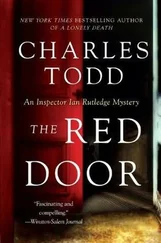Charles Todd - Legacy of the Dead
Здесь есть возможность читать онлайн «Charles Todd - Legacy of the Dead» весь текст электронной книги совершенно бесплатно (целиком полную версию без сокращений). В некоторых случаях можно слушать аудио, скачать через торрент в формате fb2 и присутствует краткое содержание. Жанр: Полицейский детектив, на английском языке. Описание произведения, (предисловие) а так же отзывы посетителей доступны на портале библиотеки ЛибКат.
- Название:Legacy of the Dead
- Автор:
- Жанр:
- Год:неизвестен
- ISBN:нет данных
- Рейтинг книги:5 / 5. Голосов: 1
-
Избранное:Добавить в избранное
- Отзывы:
-
Ваша оценка:
- 100
- 1
- 2
- 3
- 4
- 5
Legacy of the Dead: краткое содержание, описание и аннотация
Предлагаем к чтению аннотацию, описание, краткое содержание или предисловие (зависит от того, что написал сам автор книги «Legacy of the Dead»). Если вы не нашли необходимую информацию о книге — напишите в комментариях, мы постараемся отыскать её.
Legacy of the Dead — читать онлайн бесплатно полную книгу (весь текст) целиком
Ниже представлен текст книги, разбитый по страницам. Система сохранения места последней прочитанной страницы, позволяет с удобством читать онлайн бесплатно книгу «Legacy of the Dead», без необходимости каждый раз заново искать на чём Вы остановились. Поставьте закладку, и сможете в любой момент перейти на страницу, на которой закончили чтение.
Интервал:
Закладка:
Legends had grown up around raids and raiders. Ballads and tales celebrated reivers named Sim the Laird, Jock of the Side, and Kinmont Willie. After all, this was land where the shifting sands of policy, war, feuds, and alliances had often redrawn the border to suit the times. What was mine today might be yours tomorrow, and taking it back again became a popular sport.
Rutledge drove into Jedburgh through another shower and found the turning that led to Duncarrick. It was a small town in the green, rolling country between Air Water and the Tweed. A tall hedge of houses, shops, and one hotel formed an irregularly shaped nineteenth-century square with a worn monument at the top, commemorating the burning of the town three times in thirty years during the early 1500s. The pillar stood at the high end of the square, a lonely sentinel of the past surrounded by the town’s newer image. Other houses, some much older, straggled west beyond the square, and there was a modest inn among them. The wooden sign over the door read THE REIVERS. Barely a dozen streets bracketed the heart of Duncarrick and gave it an isolated feeling, as if it had been stranded in the middle of nowhere, an agricultural community untouched by the woolen tweed industry that had crowded its neighbors.
“It’s no’ a Highland town,” Hamish reflected, “but it’s no’ Sassenach either.” Not English. And he was right, there was indeed a different air here from the small English border towns no more than a hard ride away.
Where Jedburgh had once boasted walls, towers, a castle, and an abbey, Duncarrick had been burned to the ground so often that little of its past remained. A pele tower, the tall half-house-half-defensive-fortress of the raiding years, stood in a field about a mile past the last dwelling. It was little more than a tall rubble of stone and shadow now, with perhaps two floors still intact and the door slanted ajar. He passed it and then turned around in the next farm lane.
Rutledge got out to stretch his legs, leaving the motorcar parked on the grassy verge some one hundred yards from the pele tower and going the rest of the way on foot.
Such towers were a part of Rutledge’s own heritage, and he found them of absorbing interest-an architectural as well as a military solution to what must have been wretched years of constant danger. The Routledges, his own ancestors, had once been Borderers on the English side, raiding with the best of them, until a widow with three young sons had moved south in search of a more peaceful climate in which to raise them. Shrewd and capable, she’d found prosperity there as well. The Borderer had proved to be a match for clever, sophisticated Tudor London. In more ways than one.
There was a painting of her in the London house, with an impeccable ruff like a halo behind her head, a firm chin, and lively, intelligent eyes that the Elizabethan painter had captured so well that they seemed to follow the viewer about the room, staring directly, knowingly, at him wherever he stood. As a small child, Rutledge had understandably confused her with God.
He tramped across the fallow field that surrounded the tower base and heard the clamor of sheep somewhere in the distance, even before he smelled them on the damp air. Standing at the foot of the massive stone walls, looking up at the broken top where birds had nested and wind whipped through the empty windows, he became aware of someone moving toward him. Turning, he saw a man in the rough clothes of a farmer, his face reddened by the sun, his hat jammed on his head like a fixture.
“Good morning!” he called as he saw Rutledge turn. “Looking for something?”
“No, just interested in the stonework.” Rutledge waited until the man was nearer and added, “It’s amazing, the craftsmanship of the people who built this. It’s stood here what-four or five hundred years?”
“About that. Fine workmanship, I agree. Desperate times calling for desperate measures, if you like. It belonged to my wife’s family. She knows the history of it better than I do.” He took off his hat and wiped his forehead with his sleeve. “God, everything smells of sheep. I’m a horse breeder by preference. Draft horses. But the Army took nearly every animal I had, and I’ve got to start again. Meanwhile, the sheep are tiding me over.” He grinned. “It’s a near thing whether I’ll kill them first or they’ll be the death of me. Stupid beasts, they are. Even the dogs find them irritating.”
He spoke well for a farmer. An educated man.
“I’d have as little to do with them as possible,” Rutledge agreed.
“Here on holiday? There’s some good walking in the district if you know where to look. The rule is, close gates you find closed and leave open gates you find open. There’s a nasty-tempered ram here and there, but you’ll see him before he sees you.”
“Thanks, I’ll keep it in mind.”
The man nodded and walked on, whistling to his dogs, who ran, tongues lolling, some distance ahead. Their ears pricked, and they obeyed his signals instantly. Rutledge watched them. Clever animals, he’d always admired their intelligence, their speed, and the way they could drop to the ground, nearly invisible, when the command came. Working dogs these, not pampered house pets, and very good at what they did. In the Highlands especially, sheep couldn’t be run without them. He had met a man once who trained these dogs, an old rough-edged rogue who had taken his skills and his eye for instinct to New Zealand, where sheep were still king.
Rutledge went back to the motorcar and, starting the engine, headed into Duncarrick again.
He drove slowly through the main square, studying it, before he came back to the hotel and asked directions to the police station. The clerk told him, “But I doubt there’s anyone there at this time of day. And Inspector Oliver is away to Jedburgh on business. Constable McKinstry’s to home. It’s his day off.”
Rutledge left his motorcar at the hotel and walked the short distance, following the clerk’s careful instructions.
McKinstry lived behind the square, a three-story house with a fresh coat of cream paint. The buckets and ladders stood to one side, in the narrow alley between it and its neighbor, waiting for the sun to reappear. Down the same street, some twelve or thirteen buildings to the left, was the police station, its sign affixed to the door, a neat black square with white letters. As the clerk had foretold, no one was there. Rutledge turned back to McKinstry’s house. There was a fair amount of activity in the street-soberly dressed men and women going about their business. Two carters carried on a loud conversation at the next corner, then moved on as a lorry came rolling slowly past, looking to make a delivery at the apothecary’s shop.
Hamish, who had been observing the town with some interest, commented, “There’s enough money here to keep up appearances. But no’ enough to be grand. Plain people, with plain souls.”
It was, Rutledge thought, a fair verdict. McKinstry had been right-the police here dealt with the ordinary. And even murder could fall into that category.
Constable McKinstry, concealing his surprise at finding Rutledge on his doorstep, welcomed him into the parlor and waited for him to explain his visit, although there was a glint of hope in the blue-gray eyes. The paint-spattered coveralls he wore were loose-fitting, as if he’d been a stouter man before the war.
“I understand that Inspector Oliver is in Jedburgh,” Rutledge began, taking the chair McKinstry had pointed out. “Let’s be clear about that from the start. I came to see him. You were right, the Yard has put me in charge of a part of this case, and I need to know the rest of the details as soon as possible. Can you tell me when he’s expected back?”
Читать дальшеИнтервал:
Закладка:
Похожие книги на «Legacy of the Dead»
Представляем Вашему вниманию похожие книги на «Legacy of the Dead» списком для выбора. Мы отобрали схожую по названию и смыслу литературу в надежде предоставить читателям больше вариантов отыскать новые, интересные, ещё непрочитанные произведения.
Обсуждение, отзывы о книге «Legacy of the Dead» и просто собственные мнения читателей. Оставьте ваши комментарии, напишите, что Вы думаете о произведении, его смысле или главных героях. Укажите что конкретно понравилось, а что нет, и почему Вы так считаете.












